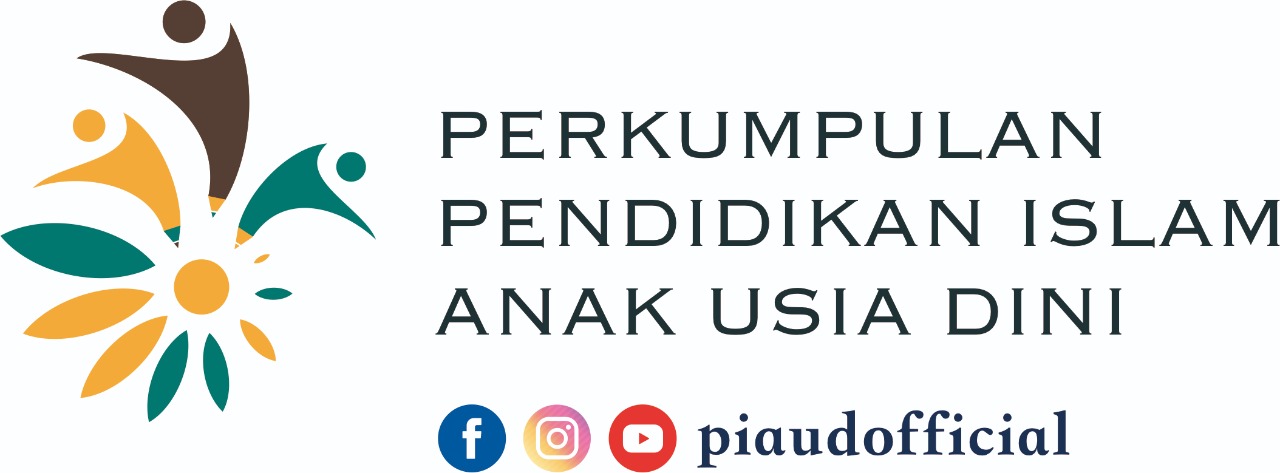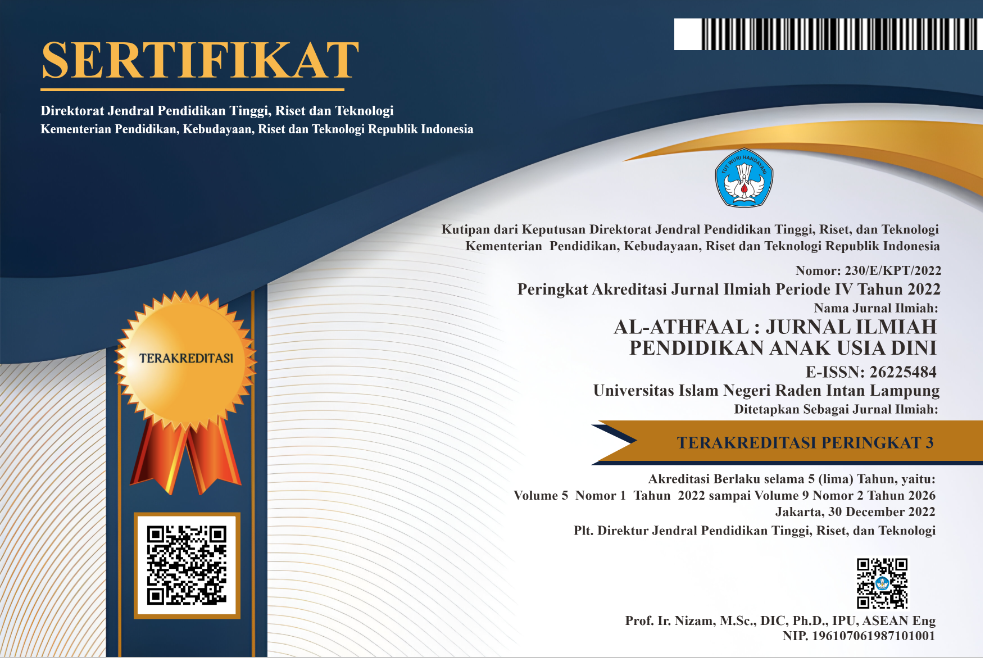Social emotional learning at global islamic school 3 yogyakarta: challenges and solutions
Abstract
Background: Social Emotional Learning (SEL) has become an important part that needs to be accomplished from an early age. However, the issue of implementing learning in kindergarten has not been widely researched, especially when viewed from the challenges and solutions for teachers. Social emotional learning is an important agenda at GIS 3 Yogyakarta to lay a solid foundation for children's personality and behavior.
Aim: This research aims to examine the challenges and solutions for SEL at Global Islamic School 3 Yogyakarta.
Method: This study employed qualitative methods with semi-structured interviews of five teachers. Data analysis includes the process of data collection, data condensation, data presentation, and drawing conclusions/verification. The validity of the data was tested through source triangulation and technical triangulation.
Results: The results of the research show that the challenges faced by teachers are the exclusive environment for children, parental care, and lack of control over the use of gadgets. Next, the teacher determines a solution, namely implementing various activities such as morning sharing, class agreements, taking turns appearing in front of the class, new and exciting games, giving reward stars, group work, circle time, market day, show and tell, cooperative games, reading stories or fairy tales, projects with parents, school habituation programs, as well as parenting and collaborating with parents regarding children's use of gadgets. Creative teachers are prudent. They have good personal and professional well-being.
Conclution: Collaboration with parents needs to be improved so that social-emotional abilities increase.Keywords
Full Text:
PDFReferences
Anggraeni, S. (2019). Pengaruh Pengetahuan tentang Dampak Gadget pada Kesehatan Terhadap Perilaku Penggunaan Gadget Pada Siswa SDN Kebun. Bunga 6 Banjarmasin.
Badilla, I. (2015). Stability of Emotional and Behavioural Problems among School going Children in Klang Valley in Malaysia. 4th Asia Pacific Conference on Public Health.
Bahlmann Bollinger & Myers. (2020). Young Children’s Writing in Play-Based Classrooms. Early Childhood Education Journal 48(2). https://doi.org/10.1007/s10643-019-00990-0.
Bassok, Latham, & Rorem. (2016). Is Kindergarten the New First Grade? AERA Open 2(1). https://doi.org/10.10.1177/2332858415616358.
Buchanan, R., Gueldner, B. A., Tran, O. K., & Merrell, K. W. (2008). Teachers’ perceptions of social and emotional learning in the classrooms. Journal of Applied School Psychology.
Coleman, M. (2013). Empowering Family-Teacher Partnership Building Connections within Diverse Communities. Los Angeles: Sage Publication.
CASEL. (2020). CASEL's SEL Framework: What Are the Core Competence Areas and Where Are They Promoted?. https://casel.org/wp-content/uploads/2020/12/CASEL-SEL-Framework-11.2020.pdf.
Candra, T. N. P., & Rizal, M. N. (2021). Sekolah Menyenangkan: Konsep Sekolah yang Mempromosikan Well-Being Berdasarkan Suara Anak-Anak, Orangtua dan Guru di Indonesia: Grounded Analisis. Jurnal Psikologi Integratif, 9(1),76–94. https://doi.org/10.14421/jpsi.v9i1.2150.
Chusna, Puji, Asmaul. (2017). Pengaruh Media Gadget Pada Perkembangan Karakter Anak'. Dinamika Penelitian: Media Komunikasi Sosial 17 (2).
Coleman, M. (2013). Empowering Family-Teacher Partnership Building Connections within Diverse Communities. Los Angeles: Sage Publication.
Cooper, J. L., Masi, R. & Vick, J. (2009). Social emotional development in early childhood: what every policymaker should know. Report Prepared for the National Center for Children in Poverty.
Denham, S. A., Bassett, H. H., Thayer, S. K., Mincic, M. S., Sirotkin, Y. S., and Zinsser, K. (2012). Observing Preschoolers’ Social-Emotional Behavior: Structure, Foundations, and Prediction of Early School Success. J. Genet. Psychol. 173 (3), 246–278. https://doi.org/10.1080/00221325.2011.597457.
Diamond, A., Lee, C., Senften, P., Lam, A., Abbott, D., & Brown, K. W. (2019). Randomized control trial of tools of the mind: Marked benefits to kindergarten children and their teachers. Plos One, 14(9), 14(9. https://doi.org/10.1371/journal.pone.0222447.
Durlak, J. A., Weissberg, R. P., Dymnicki, A. B., Taylor, R. D., & Schellinger, K. B. (2011). The impact of enhancing students’ social and emotional learning: A meta-analysis of school-based universal interventions. Child Development, 82(1), 405–432. https://doi.org/10.1111/j.1467-8624.2010.01564.x.
Durlak, J. A., Domitrovich, C. E., Weissberg, R. P., & Gullotta, T. P. (2015). Handbook of social and emotional learning: Research and practice. New York, NY: Guilford Press.
Dusenbury, L. A., Newman, J. Z., Weissberg, R. P., Goren, P., Domitrovich, C. E., & Mart, A. K. (2015). The case for preschool through high school state learning standards for SEL. In J. A. Durlak, C. E. Domitrovich, R. P. Weissberg, & T. P Gullotta (Eds.), Handbook of Social and Emotional Learning: Research and Practice (pp. 532–548). New York, NY: The Guilford Press.
Gray, P. (2013). Free to learn: Why unleashing the instinct to play will make our children happier, more self reliant and better students for life. New York, NY: Basic Books.
Halle, T. G., & Darling-Churchill, K. E. (2016). Review of measures of social and emotional development. Journal of Applied Developmental Psychology, 45, 8–18. https://doi.org/10.1016/j.appdev.2016.02.003.
Hasanah, A., Lestari, A. S., Rahman, A. Y., & Daniel, Y. I. (2020). Analisis Aktivitas Belajar Daring Mahasiswa Pada Pandemi COVID-19. Jurnal Pendidikan 1(1).
Hewes, J. (2014). Seeking Balance in Motion: The Role of Spontaneous Free Play in Promoting Social and Emotional Health in Early Childhood Care and Education. Children (Basel). 1(3):280-301. https://doi.org/10.3390/children1030280.
Hornby, G. (2011). Parental involvement in childhood education: Building effective school–family partnerships. Springer Science + Business Media. https://doi.org/10.1007/978-1-4419-8379-4.
Jones & Doolittle (2017) Keung, C. & Cheung, A. (2019). Towards Holistic Supporting of Play-Based Learning Implementation in Kindergartens: A Mixed Method Study. Early Childhood Education Journal 47(6):1-14. https://doi.org/10.1007/s10643-019-00956-2.
Morrison, G. S. (1988). Education and development of infants, todlers and preschoolers. USA: Scott, Foresman and Company.
Munafiah, N., Cucu Novianti, & Ferianto. (2023). The Position of teachers in the development of early childhood character education. Al-Athfal Jurnal Ilmiah Pendidikan Anak Usia Dini 6(1). http://dx.doi.org/10.24042/ajipaud.v6i1.15884
Musdalifah, & Indriani, N. (2017). Pengaruh intensitas penggunaan smartphone terhadap interaksi sosial mahasiswa Politeknik Negeri Samarinda. SNITT-Politeknik Negeri Balikpapan.
Nagel, M. C. (2012). In the beginning: The brain, early development and learning. Victoria, Australia: ACER Press.
Park, H., Byun, S.-Y., and Kim, K.-K. (2011) Parental Involvement and Students’ Cognitive Outcomes in Korea: Focusing on Private Tutoring. Sociology of Education, 84, 3-22. https://doi.org/10.1177%2F0038040710392719.
Pratiwi, A. (2021). Warganet Meningkat, Indonesia Perlu Tingkatkan Nilai Budaya di internet. https://aptika.kominfo.go.id/2021/09/warganet-meningkat-indonesia-perlu-tingkatkan-nilai-budaya-di-internet/.
Putriana, K., Pratiwi, E. A., & Wasliah, I. (2019). Hubungan Durasi dan Intensitas Penggunaan Gadget dengan Perkembangan Personal Sosial Anak Usia Prasekolah (3-5 Tahun) di TK Cendikia Desa Lingsar Tahun 2019. Jurnal Kesehatan Qamarul Huda, 7(2), 5–13. https://doi.org/10.37824/jkqh.v7i2.2019.112.Pratiwi, N., Kurniah, N., & Wembrayarli, W. (2021). Kendala-kendala guru PAUD dalam mengembangkan keterampilan sosial anak. Jurnal PENA PAUD, 2(1), 32. https://doi.org/10.33369/penapaud.v2i1.14730.
Pyle, DeLuca, Danniels, & Wickstrom (2020). A Model for Assessment in Play-Based Kindergarten Education. American Educational Research Journal 57(6):2251-2292. https://doi.org/10.3102/0002831220908800.
Rhoades, B. L., Warren, K., Domitrovich, C. E., & Greenberg, M. T. (2011). Examining the link between preschool social-emotional competence and first grade academic achievement: The role of attention skills. Early Childhood Research Quarterly, 26(2), 182–191. https://doi.org/10.1016/j.ecresq.2010.07.003.
Rojas, N. M., Mattera, S., Morris, P., & Raver, C. (2022). Measuring preschool teachers’ social- emotional practices: A comparison of two measures. Early Education and Development, 33(2), 326–349. https://doi.org/10.1080/10409289.2020.1864838.
Sahriana, N. (2019). Pentingnya Peran Orang tua dalam Penggunaan Gadget pada Anak Usia Dini. Jurnal Smart PAUD, 2(1), 60–66. Retrieved from http://ojs.uho.ac.id/index.php/smartpaud/article/view/5922/pdf.Sutan R., Nasreen, E.H. Ab Rahman, J., Mohd Rus R., Kartiwi M., Edhborg., M. (2018). Prevalence and determinants of antepartum depressive and anxiety symptoms in expectant mothers and fathers: results from a perinatal psychiatric morbidity cohort study in the east and west coasts of Malaysia. BMC Psychiatry.
Schonert-Reichl, K. A. (2017). Social and emotional learning and teachers. The Future of Children, 27(1), 137-155. https://www.jstor.org/stable/44219025.
Syifa, L., Setianingsih, E. S., & Sulianto, J. (2019). Dampak Penggunaan Gadget terhadap Perkembangan Psikologi pada Anak Sekolah Dasar. Jurnal Ilmiah Sekolah Dasar, 3(4). https://doi.org/10.23887/jisd.v3i4.22310Taylor, M.E. & Boyer W. (2020). Play-Based Learning: Evidence-Based Research to Improve Children’s Learning Experiences in the Kindergarten Classroom. Early Childhood Education Journal 48(10). https://doi.org/10.1007/s10643-019-00989-7.
Sutan R., Mohsmed, N.E., Abdul Rahim, M.A., Mochtar D. (2018). Systematic Review of School-Based Mental Health Intervention among Primary School Children. Journal of Community Medicine & Health Education 08(01). https://doi.org/10.4172/2161-0711.1000589.
Taylor, R. D., Oberle, E., Durlak, J. A., and Weissberg, R. P. (2017). Promoting Positive Youth Development through School-Based Social and Emotional Learning Interventions: A Meta-Analysis of Follow-Up Effects. Child. Dev. 88, 1156–1171. https://doi.org/10.1111/cdev.12864.
Taylor, M. E., & Boyer, W. (2020). Play-based learning: Evidence-based research to improve children’s learning experiences in the kindergarten classroom. Early Childhood Education Journal, 48(2), 127–133. https://doi.org/10.1007/s10643-019-00989-7.
Tucker, C., Schieffer, K., Wills, T. J., Hull, C., & Murphy, Q. (2017). Enhancing social-emotional skills in at-risk preschool students through Theraplay based groups: The Sunshine Circle Model. International Journal of Play Therapy, 26(4), 185–195. https://doi.org/10.1037/pla0000054.
Weissberg R.P., Durlak, J.A., Domitrovich., C. dan Gulotta. (2015). Social and emotional learning: Past, present, and future.
Whitebread, D., Basilio, M., Kuvalja, M., & Verma, M. (2012). The importance of play. Brussels: Toy Industries of Europe.
Zins, J. E., Bloodworth, M. R., Weissberg, R. P., & Walberg, H. J. (2004). The scientific base linking social and emotional learning to schools success. In.
Zedan, R.A (2011). Parent Involvement according to Education level, Socio-Economic Situation, and Number of Family Member. Journal of Educational Enquiry 11(1).
DOI: http://dx.doi.org/10.24042/al-athfaal.v7i2.23716
Refbacks
- There are currently no refbacks.
Copyright (c) 2024 Al-Athfaal: Jurnal Ilmiah Pendidikan Anak Usia Dini
License URL: https://creativecommons.org/licenses/by-sa/4.0
 Semua publikasi Al-Athfaal: Jurnal Ilmiah Pendidikan Anak Usia Dini [p-ISSN: 2622-5484, e-ISSN: 2622-5182] dilisensikan di bawah Lisensi Internasional Creative Commons Atribusi-BerbagiSerupa 4.0.
Semua publikasi Al-Athfaal: Jurnal Ilmiah Pendidikan Anak Usia Dini [p-ISSN: 2622-5484, e-ISSN: 2622-5182] dilisensikan di bawah Lisensi Internasional Creative Commons Atribusi-BerbagiSerupa 4.0.











